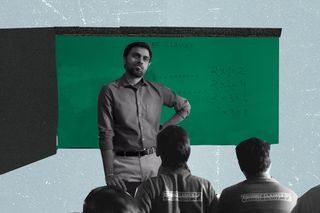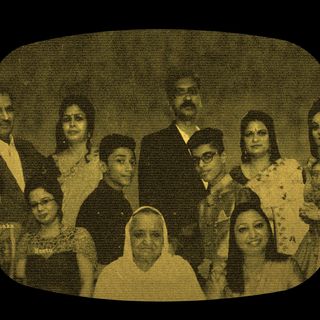
‘Kota Factory’ Fetishizes Hard Work and Merit, Perpetuating a Culture of Casteism
The show presumes the world is a level playing field and individual choices are the only determiners for success.

The protagonist of TVF’s Kota Factory, a physics teacher addressed as Jeetu Bhaiya by his students, says in an episode, “Don’t go for IIT solely because there is no life without it or because they teach well. Go for it because it is tough. Tough battles give you confidence.” This fetishization of difficulty in a show whose title carries the word “factory” seems incompatible at first. But things start falling into place when one realizes that its initial sponsor was a coaching enterprise: Unacademy.
Jeetu Bhaiya’s character relies extensively on the currency used by all coaching hubs to buy out any legitimate apprehension in the minds of young students regarding the unfairness of the process: motivation. They motivate you to aspire for exclusivity, make you believe that the achievement is associated with your self-worth, assume that the world is a level playing field, and meritocracy is the fair counterpart of an otherwise unfair system.
The show encourages the audacity to dream, as if the reason people don’t get into IITs is not its limited intake but because they don’t “believe in themselves.” Similar perspectives can be seen in the taglines of real-life coaching institutes:
“The difference between a successful person and others is not a lack of strength, not a lack of knowledge, but rather a lack of will, guidance and mentoring”(RESONANCE).
“Spirit of excellence will touch every area of education from a few weeks old fetus in a mother’s womb at vibrations level to adults at University level education” (FIITJEE).
The anti-democratization of a basic right like high-quality education has converted it into a competition, leading to the rise of coaching institutes in Hyderabad and Kota in the 1990s. And like every competition, the obvious winners are those who start out with a disproportionately higher capital. That is, one’s socio-political or caste privilege translates into advantages in terms of the capacity to pay coaching fees, ability to afford a comfortable lifestyle in the coaching hubs, the privilege of having more time to spend in the race, the comfort of knowing there is financial stability, and backup careers.
In this system, antithetical to social justice, and fixated on “excellence,” winning a contest already skewed in one’s favor easily passes as “merit.” In reality, as Suraj Yengde put it, it’s only a euphemism for caste nepotism.
Related on The Swaddle:
Casteism Still Thrives in Elite Schools in India. What Would Anti‑Caste Education Look Like?
“Having encashed its traditional caste-capital and converted it into modern forms of capital like property, higher educational credentials and strongholds in lucrative professions, this section believes itself to be ‘casteless’ today,” wrote Satish Deshpande about the so-called general category.
The philosophy of Kota Factory resonates with the neoliberal belief that one can transcend all barriers to success — including their socio-economic positions — only if they stop procrastinating and start making more responsible choices. This ideology is also typically propagated as a criticism of welfare schemes or affirmative action meant to tackle systemic inequities.
This “aspiration” leads people to covet what is only possible for the privileged and maintains a socially approved hierarchy: as the marginalized are convinced their failure is a result of their own insufficiency and not an oppressive system. That they probably do not “deserve” equal rights. That the ones who do have won by the rules and are self-made, never mind if the rules were set to help them win.
In Kota Factory, the love for hierarchy is clear. When a student considers leaving the race and taking up a seat at an NIT, Jeetu Bhaiya asks her to “stop aiming for what’s easy instead of what’s the best” and that “IITs are IITs after all.” Later in the show, she attempts suicide after the JEE Advanced results. The show, and the system it represents, are blind to the fact that motivation can’t help when the bottleneck is not an undedicated student but limited opportunities.
The association of social worth with clearing IIT-JEE surfaces at multiple points in the show. In one scene, the students seem disillusioned when a teacher doesn’t turn out to be an IITian himself.
Jeetu Bhaiya also stigmatizes quitting without considering that people pay unequal prices to merely remain in the race. The lack of ambition that he considers a vice is the culmination of a prolonged lack of resources; the accumulating burden of scarcity.
It is also difficult for Bahujan students to get the help they need since the access to opportunities is not equitable by design. One’s insistence on their poverty is dismissed as a distraction, one’s inability to pay rent an excuse, one’s decision to chase different targets that don’t demand as much from them is thought of as defeat.
Related on The Swaddle:
Making Indian Legal Education More Inclusive Is Key to Building a More Equitable Judicial System
Further, it’s also difficult to get support from one’s peer groups since that too is viewed from a “success” lens. Jeetu Bhaiya reminds a student, “If you are the smartest in your class, you are probably in the wrong class” — because, in this self-centered individualistic contest, the only company worth keeping is one that carries utility.
Jeetu Bhaiya repeatedly urges the students to come out of their comfort zones, but what about those who have never had a “comfort” zone to begin with? Climbing out of your comfort zone to test uncertainties is possible only if one’s basic needs can be taken for granted.
For instance, when Vaibhav Pandey is diagnosed with jaundice, his mother is able to immediately travel from Itarsi (Madhya Pradesh) to Kota (Rajasthan) and stay with him for a week so he can recover. This simple act of seeking support at short notice and having your entire family alter their circumstances is hardly imaginable for a student from, say, a migrant family engaged in the informal sector because of the travel expenditure and work leaves involved.
It’s also worth noting how the show portrays characters from oppressed castes. Balmukund Meena lurks in the background of the story with no personality of his own. He is shown as gullible, naive, conservative, and constantly underscoring his poverty. He exists to make others contemplate their own privilege, to remind them in their bad times that it could have been worse. He exists for the sake of contrast. He isn’t assertive like the Pandeys and Guptas in his circle: existing passively, never demanding conflict or screen space.
The show eerily resembles Aspirants and Pitchers by the same makers (The Viral Fever) in its caste-blindness and its tired dependence on nostalgia as a trope. In Pitchers, there is the usual valorization of risk-taking and job-quitting for the courageous plunge into entrepreneurship, without any depiction of how this is a game of privilege where what looks like smart entrepreneurial abilities is actually a result of caste networks and social security. Pitchers looks down upon the ordinariness and mundanity of 9-to-5 jobs in a country with an unemployment problem and suggests a clear solution to capitalism: be in the seat of the oppressor as a big business owner instead of being a slave of the system as a salaried employee.
“Under the assumption of meritocracy, the very notion that personal success is the result of ‘luck’ can be insulting,” as writer Clifton Mark said.
A relatively better reflection on Kota as a coaching hub is Hemant Gaba’s documentary An Engineered Dream. It captures the dehumanization and alienation that a teenager faces in the graveyard of childhood that Kota is: A city where sixteen-year-olds are perpetually going from one class to another, where table lamps never go off at night, where sunrises and sunsets are flanked by an army of billboards constantly reminding you of other people’s successes. But even as children’s self-esteem is battered and their fates decided by their identities, the ones who emerge as clear winners every year are the Maheshwaris, Bansals, and Agarwals — those who own these factories.
Bijaya Biswal is a medical doctor and a public health researcher currently studying the intersections of mining, indigenous rights, and health. She writes on cinema, environment, and caste.
Related


DC Unveils Bisexual Superman. How Meaningful Is the Gesture?
